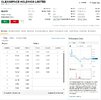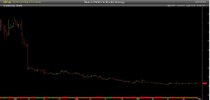- Joined
- 1 December 2023
- Posts
- 98
- Reactions
- 81
I tried that with CSX and it aint working for me yetThe key to successful investing is buying quality stocks at a reasonable price and holding them for the long term.
Skate.
I tried that with CSX and it aint working for me yetThe key to successful investing is buying quality stocks at a reasonable price and holding them for the long term.
Skate.
I tried that with CSX and it aint working for me yet


but one GP i consulted suggests i will not live forever ( at last according to the statistics )The key to successful investing is buying quality stocks at a reasonable price and holding them for the long term.
Skate.
but one GP i consulted suggests i will not live forever ( at last according to the statistics )
the other issue i have discovered is not many companies stay listed for 100 years ( or more ) ( take-overs , failures , break-ups , moves internationally )
remember i inherited a portfolio of 4 survivors from a relative that started investing in the '70's ( maybe earlier )
those survivors were APE , CSR , QAN and WOW , ones that didn't make it include Rinker , Ansett , Mount Isa Mines , McDonnell & East , Nylex
The key to successful investing is buying quality stocks at a reasonable price and holding them for the long term.
Skate.
I'm sure with "all certainty" that the financial outlook for 2024 will be a mixed bag with several factors impacting the market - therefore staying informed and being mindful of the potential risks and opportunities that may arise in the coming year is my advice.


All posted have their merits. I can add to it, the ultimate test is your own financial stamina. Are you ok to HOLD when the share price hit the s... fan by 10 to 20% If you hold a good company for a long term investment? It's always a challenge to hold back in your heart while the mind said WALK AWAY now.
Why 2024 could be a year for ASX bulls

Why 2024 could be a year for ASX bulls
These money managers are fully invested in Australian equities.www.livewiremarkets.com
now i disagree with the thematic here
the bulls i will be watching this year have four legs and eat grass
Imho, A quality stock is not based on chart, dividends but on PE and debt ratio return on money invested reinvested etc etc@Prepper Pete the key to successful investing is buying quality stocks.
Please, tell me what I'm missing or better still, "explain what you saw" that no one else did.
View attachment 168452
View attachment 168453
Skate.
Got a nice big black one on my tag with a younger grey one coming on. The year of the bull !!!!Why 2024 could be a year for ASX bulls

Why 2024 could be a year for ASX bulls
These money managers are fully invested in Australian equities.www.livewiremarkets.com
now i disagree with the thematic here
the bulls i will be watching this year have four legs and eat grass
@Skate, are you looking to eventually build a portfolio that is manageable in number of stocks that meet your criteria but also diversified rather than the few large financials and iron ore companies that dominate the portfolio?
My aim is to create a diversified investment portfolio - companies that pay stable dividends and franking credits and have the potential to increase returns over the long term. I'm always looking for ways to improve and diversify my portfolio,
Would you consider looking at companies that may currently be more focused on growth (retaining more of their earnings than paying out as div) with potential (that management growth plans do come to fruition) to produce higher future earnings due to re-investing in their business and potentially pay higher percent of earnings as dividend (3-5+ years)? Could be smaller holdings, more like the satellite portion of an overall investors portfolio.
Was pleasantly surprised at your move to passive investing and more so if you are going all in. 12 months ago I started a small investing portfolio with aim of producing passive returns, more so in next 3-10+ years. Partially because my 3 trading systems (2 systems I wrote up in Amibroker & a 3rd that takes signals from a business that provides trading strategies.) are still producing negative returns after 2 1/2 years (though within drawdown parameters). Rather than ditching trading, I decided to focus on trimming down to 1 or 2 trading system and build up investing portfolio, as don't feel more connected to one style over the other, also very interested to see how they both perform over the longer term, do I have far better success with one style over the other. Trading systems return average in 2022 was -16.27%, 2023 was -6.24%, investing portfolio in 2023 was 17.29%.
the little Aussie battler to gain serious ground on the US dollar ?? i think notIn my opinion
It all hinges on the value of the US dollar. A weak US Dollar will be good for us. I'm sure @ducati916 can explain why much better than I could.
Skate.
the little Aussie battler to gain serious ground on the US dollar ?? i think not
it would most likely be detrimental to most of the ASX shares i hold with US/EU exposure@divs4ever, what I was saying is that a weaker U.S. Dollar tends to have a positive impact on the U.S. markets, which in turn can have a positive effect on the ASX.
Skate.
re. your current portfolio, specifically banks, which are de facto black boxes with huge off balance sheet liabilities. ANZ and CBA both carry significant derivatives positions, only partially disclosed in the financials. Could they potentially blow the bank up?
I decided to focus on trimming down to 1 or 2 trading system and build up investing portfolio, as don't feel more connected to one style over the other, also very interested to see how they both perform over the longer term,
Hello and welcome to Aussie Stock Forums!
To gain full access you must register. Registration is free and takes only a few seconds to complete.
Already a member? Log in here.